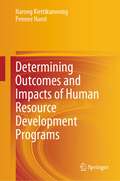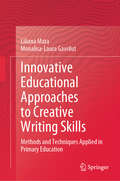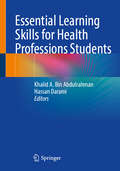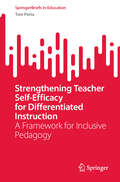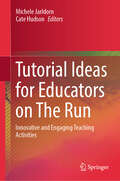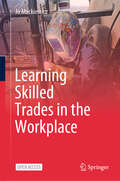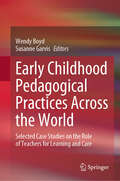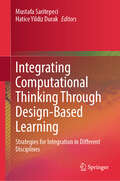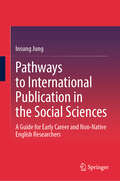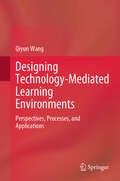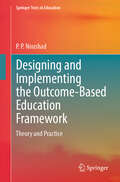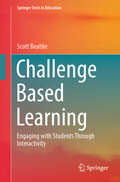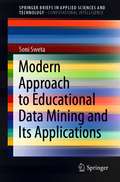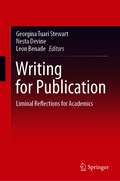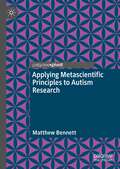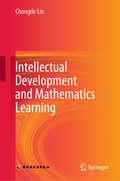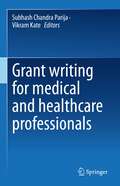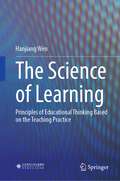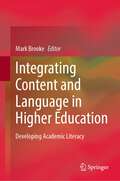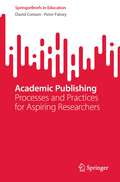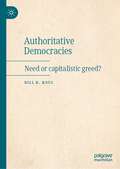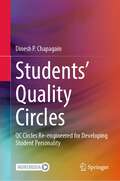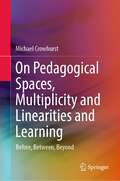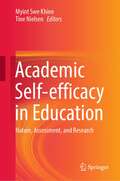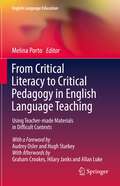- Table View
- List View
Determining Outcomes and Impacts of Human Resource Development Programs
by Pennee Narot Narong KiettikunwongThis book takes readers on a comprehensive journey through ten chapters, seamlessly blending insights from the introductory chapter emphasizing the importance of human resource research with subsequent chapters delving into the complexities of evaluation, program conceptualization, and the integration of Theory of Change and Logic Model. The critical examination of prominent evaluation models, exploration of Participatory Evaluation's role, and the need for an integrated evaluation model are highlighted. The narrative culminates in a practical illustration of the integrated model, emphasizing its effectiveness, insights gained, and contributions to the field, while acknowledging limitations and offering recommendations for improvement. The book serves as a valuable resource for HR practitioners, evaluators, and organizational leaders, providing practical guidance and contributing substantively to the improvement of HR practices and organizational performance.
Innovative Educational Approaches to Creative Writing Skills: Methods and Techniques Applied in Primary Education
by Liliana Mata Monalisa-Laura GavrilutThis book provides innovative educational approaches to the development of primary school students' creative writing skills and highlights the need to develop creative writing skills in today's schools. It presents the educational model of creative writing skills training, which combines all curriculum components: educational objectives, curricular contents, teaching methods and techniques, and competency-based assessment. This book also explores new perspectives such as creative writing as art, freedom, and exploration, the digitization of creative writing, and promoting reflective learning through creative writing exercises. This book serves as a useful guide for educators to foster creative writing in primary school classrooms, as well as for researchers in the field of language teaching, and other readers who are interested in the topic.
Essential Learning Skills for Health Professions Students
by Khalid A. Bin Abdulrahman Hassan DaramiThis book covers the learning and teaching objectives for the teachers and students of the health profession. It covers not only the conceptual framework of learning, teaching, and studying but also addresses students' needs, including effective communication, study habits, and stress management. The chapters integrate the basics of a course with its clinical science. From active learning strategies to problem-based learning techniques, the book covers effective methods for engagement and self-directed learning. Additionally, it addresses essential skills such as time management, critical thinking, and information retrieval. Supplemented with easy-to-read text, illustrations, and summary boxes explaining educational messages, the book aims to ease learning. The book is relevant for both students and professionals in medicine and health sciences, helping them understand the basics of teaching and learning for health professions students.
Strengthening Teacher Self-Efficacy for Differentiated Instruction: A Framework for Inclusive Pedagogy (SpringerBriefs in Education)
by Tom PortaThis book offers a comprehensive exploration of the theoretical underpinnings and practical implications of differentiated instruction. By fostering a deeper understanding of the factors influencing the effective implementation of differentiation practices, the book seeks to empower educators to create inclusive learning environments that cater to student diversity. In doing so, it can shape pedagogical practices and inform policy decisions on a global scale, thereby advancing the cause of inclusive education across diverse educational contexts. This book enriches the understanding of differentiated instruction by introducing a new framework focused on strengthening teacher self-efficacy in differentiation. Additionally, it highlights the importance of support from school leadership and colleagues in implementing differentiation successfully. Featuring extracts from participant interviews to immerse readers in the empirical data, it provides insights into the challenges and opportunities inherent in differentiated instruction. With its focus on developing practical strategies and frameworks for differentiation, the book holds significance for educators worldwide grappling with student diversity.
Tutorial Ideas for Educators on The Run: Innovative and Engaging Teaching Activities
by Michele Jarldorn Cate HudsonThis professional book offers practical materials that provide fellow academics with tools to structure and scaffold learning experiences that reflect the practice context in which social work and human services are offered. It serves as a practical resource tailored for teaching academics in social work and human services education, and it is designed to be useful for learning across other social science and education disciplines as well. The chapters describe the pedagogy informing the design of the learning activities and present and describe specific teaching activities designed to engage students with complex subject matters. Where applicable, some chapters include downloadable resources to be used and implemented by the reader in their teaching. This book is organised into discrete themes that include skills-based activities, embedding academic literacy activities into teaching, social justice learning activities, small group teaching and learning online, using case studies and vignettes for small group learning and embedding learning through games and arts-based artefacts.
Learning Skilled Trades in the Workplace
by Jo MackiewiczThis open access book describes and explains a fifty-year-old woman’s process of developing trade competences. Drawing from daily journal entries, photographs, interviews from 10 fabrication shops, and online forums about trades, this autoethnography details the author's learning process at Howe’s Welding and Metal Fabrication, where she has worked for over three years. This book uses accessible, everyday language and draws heavily from personal experience in trades, taking the value of trades as a given and explaining the process of developing the depth and breadth of conceptual and procedural knowledges—the competences—required to work in repair and fabrication shops like Howe’s. This book combines a research-derived framework for analyzing scaffolded learning and expertise development with stories of learning how and learning what. Readers will gain a better understanding of knowledge development in trades workplaces, including how one-to-one interactions scaffold knowledge, how workers gradually enter a community of practice, and how workplaces can constrain learning. This book also gives readers a view of workplace learning over time and helps readers—researchers and practitioners—recognize opportunities for development toward expertise. The book is useful for tradespeople, especially newcomers to trades and, in particular, women.
Early Childhood Pedagogical Practices Across the World: Selected Case Studies on the Role of Teachers for Learning and Care
by Susanne Garvis Wendy BoydThis book explores pedagogical practices for early childhood education around the world in a collective of practices. The motivation for this book was to collect pedagogical practices from around the world to showcase the important work of early childhood teachers. Each country in this book shares unique features of their pedagogical work to show how they support young children’s learning and development, and work with families and communities. This intention also allows the documentation of innovative and exemplary practices to build a repertoire of pedagogy and understand cultural and contextual differences. Across the countries, this book explores routines, transitions, intentional teaching, shaping the environment, and other important aspects of learning and care. This book also provides opportunities for the development of commonality of practice, and to explore variations that exist around supporting young children’s learning and development.
Integrating Computational Thinking Through Design-Based Learning: Strategies for Integration in Different Disciplines
by Mustafa Saritepeci Hatice Yildiz DurakThis book creates a theoretical framework to consider the integration of computational thinking (CT) into learning and teaching processes in different contexts from a design-based learning (DBL) perspective, and presents various intervention studies. The chapters each focus on a different aspect of CT integration through DBL, providing an overview and discussing the benefits of integrating CT into the curriculum. The book also discusses the design thinking process and how it can be used to promote CT, focusing on CT concepts and considering perspectives on how these concepts can be integrated into DBL activities. It also explores how artificial intelligence (AI)-based design-oriented learning activities can be used to develop students' CT skills, examines the information technology (IT) concept of pattern recognition, and provides examples of how this can be integrated into DBL activities. It presents practical examples on integrating CT into the teaching-learning process from a design-based learning perspective, summarizes approaches to assessing CT skills, and discusses them in the context of design-based learning. Lastly, this book also conducts a bibliometric analysis of publication and citation trends in computational thinking research conducted in design-based learning.
Pathways to International Publication in the Social Sciences: A Guide for Early Career and Non-Native English Researchers
by Insung JungThis guide offers a clear step-by-step approach for graduate students and early-career researchers, especially non-native English speakers, seeking to publish in international journals in the social sciences. It provides practical strategies for preparing, submitting, and refining research papers, helping researchers navigate the challenges of academic publishing. With 21 chapters, the guide covers every stage of writing, revising, and submission, while addressing the unique obstacles faced by non-native English speakers. The guide helps researchers identify reputable journals, avoid predatory ones, and use digital tools to meet international standards. It then provides a structured roadmap that simplifies the publication process, covering steps like journal selection, writing compelling abstracts, and drafting the methods and results sections. By the end of the guide, it is expected that researchers will have a strong first draft or, ideally, a submission-ready manuscript. The guide also addresses language barriers, cultural differences, and unfamiliarity with international conventions. It offers practical solutions for improving English writing, utilizing digital tools, responding to peer reviews, and managing revisions effectively. It emphasizes ethical guidelines like avoiding plagiarism, properly crediting co-authors, and ensuring research transparency to help researchers meet global standards. Unlike other research guides, this one is specifically tailored to early career and non-native English researchers working in social science disciplines. It offers practical strategies and real-world examples to equip researchers—and teachers of research methods and academic writing—with a framework for achieving publishing success in global academia.
Designing Technology-Mediated Learning Environments: Perspectives, Processes, and Applications
by Qiyun WangThis book helps teacher designers better understand the roles of technology in education, the key design perspectives of a technology-mediated learning environment (TMLE), the design considerations for each perspective, and the design processes of a TMLE. This book presents a generic conceptual framework, called Pedagogical, Social and Technical design (PST), to illustrate the main design perspectives of the TMLE and their relationship. It also describes a pragmatic design approach, the educational design research approach, for teacher designers to easily follow when they are designing TMLEs. This book also demonstrates two application examples using the PST framework as a design tool to design a blended synchronous learning environment and as an analytical tool to evaluate the educational affordances of an information and communication technology tool.
Designing and Implementing the Outcome-Based Education Framework: Theory and Practice (Springer Texts in Education)
by P. P. NoushadThis textbook presents a theoretical overview of the idea of Outcome Based Education (OBE), together with research and practical inputs for practitioners. It discusses the evolution of the ideas of OBE, Aligning Outcome and Curricular Content, Aligning Outcome and Modes of Transaction, and Aligning Outcome and Evaluation. It also provides practical guidelines with illustrations on how to design courses and curricula for school education, as well as higher education, using the OBE Framework. It serves as a useful guide for students, teachers of all levels, teacher educators, and other educational practitioners.
Challenge Based Learning: Engaging with Students Through Interactivity (Springer Texts in Education)
by Scott BeattieDrawing on Game-Based Learning and other innovations, this textbook establishes the Challenge Model of learning—an interactive format that involves meaningful learner decisions leading to exploration of different outcomes. It includes more than 50 different examples of challenges which can be applied to different sites of learning, schools and universities through to professional training. While the challenges are suitable for use 'out of the box', this textbook also presents design principles and tools for those seeking to create their own challenges. It also includes additional in-depth discussion of several different projects for more comprehensive integration of challenges into the curriculum and using innovative technologies to enhance learning. This textbook is useful for teaching students seeking to understand how interactivity can be integrated into their design toolbox and also serves as a resource for current teachers to develop their teaching approach and seek out new options.
Modern Approach to Educational Data Mining and Its Applications (SpringerBriefs in Applied Sciences and Technology)
by Soni SwetaThis book emphasizes that learning efficiency of the learners can be increased by providing personalized course materials and guiding them to attune with suitable learning paths based on their characteristics such as learning style, knowledge level, emotion, motivation, self-efficacy and many more learning ability factors in e-learning system. Learning is a continuous process since human evolution. In fact, it is related to life and innovations. The basic objective of learning to grow, aspire and develop ease of life remains the same despite changes in the learning methodologies. Introduction of computers empowered us to attain new zenith in knowledge domain, developed pragmatic approach to solve life’s problem and helped us to decipher different hidden patterns of data to get new ideas. Of late, computers are predominantly used in education. Its process has been changed from offline to online in view of enhancing the ease of learning. With the advent of information technology, e-learning has taken centre stage in educational domain. In e-learning context, developing adaptive e-learning system is buzzword among contemporary research scholars in the area of Educational Data Mining (EDM). Enabling personalized systems is meant for improvement in learning experience for learners as per their choices made or auto-detected needs. It helps in enhancing their performance in terms of knowledge, skills, aptitudes and preferences. It also enables speeding up the learning process qualitatively and quantitatively. These objectives are met only by the Personalized Adaptive E-learning Systems in this regard. Many noble frameworks were conceptualized, designed and developed to infer learning style preferences, and accordingly, learning materials were delivered adaptively to the learners. Designing frameworks help to measure learners’ preferences minutely and provide adaptive learning materials to them in a way most appropriately.
Writing for Publication: Liminal Reflections for Academics
by Leon Benade Georgina Tuari Stewart Nesta DevineThis book focuses on academic writing and how academics who are experts in their fields can translate their expertise into publishable form. The magnitude and speed of the changes that are transforming the global academic landscape produce an ongoing need for literature that interprets the nature of academic work. This book arises from the background discipline of Education, which is a relatively new university subject that draws on the entire knowledge spectrum from the fine arts to the natural sciences. Each chapter addresses an aspect of the conditions of written academic labour in an age of digital publishing: its nature, how it works, and guidance for successful navigation. This book will provide helpful guidance to graduate students, researchers and teachers in universities and higher education, who are united by the challenges of this new world of academic publishing.
Applying Metascientific Principles to Autism Research
by Matthew BennettThis book presents several metascientific strategies and explains how they can be used to improve research about the autism spectrum. It begins with an introduction to the field of metascience and the benefits that it brings to academic disciplines and society. It then outlines recommendations that researchers can adopt so that they do not incorporate specious autism research from predatory publishers into their research activities. An introduction to reproducibility and strategies that can improve the reproducibility of autism research are then outlined. This is followed by chapters about improving the peer review process and reducing the prospect of questionable research practices from occurring. This book concludes with a chapter about strategies that researchers can use to improve the participation of autistics in research. Such knowledge will equip academics, regardless of their experience, with the skills and expertise they need to produce high-quality and inclusive research about the autism spectrum.
Intellectual Development and Mathematics Learning
by Chongde LinThis book introduces the outcomes of author’s 40 years of research, especially the theory of “the Triangular Pyramid Structure of Thinking” that he independently proposed, and the application of his development theory in the field of mathematics education. The book firstly explains the substantial character of intelligence, the development law of intelligence, and the relationship between intelligence development and creativity cultivation. Secondly, it discusses the structure of mathematical thinking of children and adolescents from 0 to 18 years old, and the methods of developing students’ thinking ability and the quality of intelligence through arithmetic learning. In the end, this book also demonstrates the characteristics of the development of mathematical thinking ability of children at age 0-6, elementary school students, and secondary school students, and the related latest research in this field. Based on the theory of “the Triangular Pyramid Structure of Thinking”, a number of examples are given to illustrate how the theory of intelligence development can be used in mathematics teaching to promote the development of students’ thinking abilities and to improve the quality of teaching.This book covers various areas including psychology, mathematics, and education. It has a great reference value for scholars in the field of psychology to study the theory of intelligence and the structure of thinking, providing guidance for parents and mathematics teachers to promote children’s quality of intelligence and mathematical thinking abilities, and to enhance their mathematics learning effects. In addition, it provides examples for psychological research to serve specific subject teaching in elementary and secondary schools.
Grant writing for medical and healthcare professionals
by Subhash Chandra Parija Vikram KateConducting research requires resources to meet the research need. The resources in the research institutes/ centers are often inadequate, limiting the research outcome. Research grants help overcome those limitations and help the researchers carry out quality research without any restriction. Grant proposal writing is an essential skill to be mastered by every researcher. However, the majority of the medical schools, except the few research institutes, do not have a structured learning module for obtaining grants. On most occasions, the skill of writing grant proposals goes by self-learning. For students, it is burdening due to the tremendous time consumed to learn the craft of writing the grant proposal and the exhausting clinical and academic work. This book is carefully prepared to keep in mind the difficulties faced by the young researchers and the students concerning choosing a funding agency, grant makers' expectations, budgeting, surveillance and site visits, rights of the researcher and the funding agency, and ethical and legal aspects of obtaining the grant. The book also covers the alternate plan for partial funding or interruption of the financing, reporting the source of funding and acknowledgment, good clinical practice guidelines, and dealing with the rejected grant proposal. The research projects are often dropped or modified extensively due to the limited resources in the existing facility. The researchers are forced to compromise the research objective due to expensive requirements. There is a shortage of awareness regarding the availability of funding and grant for the conduct of research. Even if the researchers are aware of obtaining the financing, there is a lack of training in grant proposal writing, which is essential in getting the research funding. This book on grant proposal writing for medical and healthcare professionals covers such difficulties and deficiencies. It will provide complete companionship from knowing the funding agency to obtaining the grant.
The Science of Learning: Principles of Educational Thinking Based on the Teaching Practice
by Hanjiang WenThis book systematically summarizes the author's more than 30 years of experience in teaching reform and educational research. The book is divided into three parts. Part I focuses on the comprehensiveness of thinking and the relationship between the coordinated development of thinking and the overall development of human beings. Part II and Part III mainly discuss the six basic principles of learning and thinking: the principle of the working memory of thinking, the principle of learning transfer, the principle of the basic process of learning, the principle of multi-level development of ability, the principle of sustainable development of learning, and the principle of subjectivity of learning.This book features the rules and characteristics of student learning with a student-centered approach, which can help teachers and educational researchers to better understand students and provide theoretical guidance for students’ all-round development.
Integrating Content and Language in Higher Education: Developing Academic Literacy
by Mark BrookeThis book presents research initiatives by tutors involved in a content-based instruction context as part of the University Town writing programme, National University of Singapore, which is an interdisciplinary programme designed to teach first- and second-year undergraduate students how to conduct academic research and write evidence-based research papers. It presents research the tutors conducted within the dual fields of teaching discipline-specific content and developing students’ academic literacy. The book focuses mainly on pedagogy and material development in this context. It shares the tutors' scholarship of teaching and learning experiences from this programme through presenting action research from the classroom, demonstrating constructive cycles of praxis, which are then evaluated using student texts and student feedback. The book draws on academic research literature related to content-based instruction, as well as topics such as facilitating collaborative peer reviews of assignments, and critical thinking pedagogy. It covers how multi-disciplinary or multi-lingual classrooms of this genre can motivate students to conduct and write up research and provides an overview of how both content and academic literacy is combined at a high level of engagement from an Asian context.
Academic Publishing: Processes and Practices for Aspiring Researchers (SpringerBriefs in Education)
by David Coniam Peter FalveyThis book focuses on the topic of academic publishing. It discusses the mounting, serious problems that researchers, particularly new researchers, encounter when trying to publish their research. The book addresses the issues of publishing as well as the salient factors militating against academic publication and the mitigating factors encouraging academic publication. It provides potential solutions, suggestions, and strategies for overcoming some of these problems. Growing research output from Southeast Asia including Singapore, Malaysia, Taiwan, and China reveals the struggles that many authors have to confront when attempting to publish their work in reputable journals. In both South Africa and other parts of Africa, academic researchers are beginning to show strong evidence of credible academic output. These researchers all need valid outlets for their work and the security that authentic peer review brings to the reviewing process. In the fields of education, social sciences, and professional practices, e.g., architecture and law, recent years have seen the emergence of new outlets for practitioners’ research outputs in areas such as one’s own practice, self-reflection, and narrative inquiry. These outlets are discussed in this book. The book also discusses the malign influence of predatory publications in detail. This book will be beneficial to university academics, postgraduate students, Ph.D. supervisors, and new researchers.
Authoritative Democracies: Need or capitalistic greed?
by Bill K. KoulThis book comments on growing authoritarianism in democracy and suggests how it ought to be instead. It asks if some degree of authoritarianism is the need of the hour to address potentially existential issues facing the human race. Readers are encouraged to analyse the state of democracy in their own countries and verify if it meets their expectations, or if it is just a myth or an imposter, or a necessary but imperfect compulsion in the absence of a perfect alternative. The book presents a commentary on the state of democracy in some of the world’s leading democracies. It aims to challenge the human mind, which seems to be getting accustomed to not having to think, thanks to a constant bombardment of information—real and fake and in-between—that it receives through social and print media, which is freely accessible through smartphone to which it has become addicted. It discusses how the drivers of capitalism – through their business-like connections with powerful and influential politicians and celebrities—could be cleverly manipulating the gullible human mind and exploiting the system to their own material benefit.
Students’ Quality Circles: QC Circles Re-engineered for Developing Student Personality
by Dinesh P. ChapagainThis book explains what Students' Quality Circles (SQC) are, how they function, key constraints and issues in implementation, and possible solutions to make it a valuable co-curricular activity. It showcases how Quality Control Circle (QCC) is reengineered with the sole purpose of prosocial personality development of students at their early age. It is a research outcome which depicts the direction of the education system toward character building rather than only developing knowledge and skills. The logical sequence of presentation of the book is ‘why,’ ‘what,’ and toward the end, ‘how’ SQC in education. The book satisfies four hierarchical levels of readers. The first level is of educationists and national policy makers who may take up SQC as an important approach of the education system in their country for prosocial personality development of students and thereby targeting to produce quality citizens in the future. At the second level are chief executives or managers of educational institutes who may identify the potential of SQC approach for developing the positive personality of their students. Teachers and SQC facilitators are at the third level, and they can use the book to train and educate their students while initiating and promoting SQC activities at their institutes. And finally, at the fourth level obviously are students who may refer to this book from time to time and practice SQC on their own for self-development and empowerment.
On Pedagogical Spaces, Multiplicity and Linearities and Learning: Before, Between, Beyond
by Michael CrowhurstThis book introduces a research method called ‘auto-teach(er)/ing-focused research,’ a research process that aims to document understandings generated by, and for the teacher when that teacher teaches or re-teaches a course. It demonstrates how this method is applied by the author/researcher within the pedagogical space that is the teaching of a course, one that has been taught numerous times by the author/researcher over many years. This book documents understandings about learning and teaching that have emerged within the pedagogical space that is the teaching of a course, and the pedagogical space that is the writing of a book. It explores the notion that pedagogical spaces are complex, and that subjects navigate and are produced within them in a multiplicity of ways. This book applies a research method that generates a knowledge product that research practitioners in a variety of settings might find useful to adopt or adapt.
Academic Self-efficacy in Education: Nature, Assessment, and Research
by Myint Swe Khine Tine NielsenThis book documents systematic, prodigious and multidisciplinary research in the nature and role of academic self-efficacy, and identifies areas for future research directions within the three sections of the book: 'Assessment and Measurement of Academic Self-efficacy', 'Empirical Studies on What Shapes Academic Self-efficacy', and 'Empirical Studies on Influence of Academic Self-efficacy'. The book presents works by educators and researchers in the field from various parts of the world, highlighting advances, creative and unique approaches, and innovative methods. It examines discussions around the theoretical and practical aspects of academic self-efficacy in culturally and linguistically-diverse educational contexts. This book also showcases work based on classical and modern test theory methods, mediation and moderation analysis, multi-level modelling approaches, and qualitative analyses.
From Critical Literacy to Critical Pedagogy in English Language Teaching: Using Teacher-made Materials in Difficult Contexts (English Language Education #23)
by Melina PortoWith a Foreword by Hugh Starkey and Audrey Osler, and Afterwords by Graham Crookes, Hilary Janks and Allan Luke, this book promotes critical language education and illustrates how a critical agenda can be enacted in English language education in real classrooms. It presents four cases located in primary and secondary schools in the province of Buenos Aires in Argentina in contexts that can be characterised as vulnerable or difficult. It describes the possibilities, challenges and limitations of this critical agenda using students’ drawings, posters, leaflets, artwork, classroom activities and conversational data as foundation, and including the voices of local teachers in their classrooms. Importantly, these teachers used teacher-made, locally produced, critical post-method materials, described by the author of those materials in one of the chapters. In this way, the book offers a unique balance of researcher, teacher and materials writer voices. These materials are included in the book and can help language teachers around the world to introduce critical perspectives in their specific contexts. The book is appealing to researchers, classroom teachers, teacher educators, and materials writers and developers interested in critical language education.
